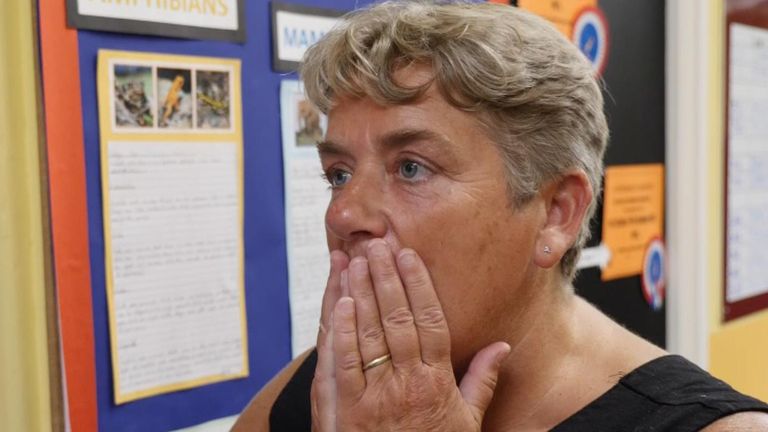Collapse-prone concrete has been found in the Houses of Parliament.
Reinforced autoclaved aerated concrete, known as RAAC, was a common building material used in the post-war era as it was cheaper and lighter than traditional concrete.
But it is now proving a nightmare for the government as it has been found to have a 30-year lifespan before becoming susceptible to collapse.
Politics latest: Former MI6 chief ‘concerned’ about who has access to parliament
Hundreds of schools have been checked for RAAC – with some told to partially or fully close buildings – while hospitals and airports have also been found to contain the concrete.
A parliamentary spokesperson said: “As part of routine ongoing investigations, RAAC was identified in one area of the Palace [of Westminster].
“Structural engineers have confirmed there is no immediate risk. Where RAAC is found, mitigations will be put in place as necessary.”
It is understood the concrete was found in an area which was built in 1974.
Elsewhere, more than 600 schools have now been checked for RAAC, according to senior Department for Education (DfE) officials.
A list of 147 schools where RAAC had been found was released last week, but this was already a week out of date.
Permanent secretary at DfE, Susan Acland-Hood, and chief operating officer Jane Cunliffe appeared before the Public Accounts Committee (PAC) on Monday.
Ms Cunliffe said that in more than 600 schools assessed, two-thirds had not been found to have RAAC.
But the officials could not confirm how many surveys they were waiting to get back from schools.
Ms Cunliffe said: “It is very fast moving, we are doing tens of surveys every day.”
Read more:
Minister swears on camera in school concrete rant
What is RAAC and why was it used so much?
List of schools in England affected by unsafe concrete
Meanwhile, Ms Acland-Hood praised Education Secretary Gillian Keegan, who was caught on camera last week complaining about not being thanked for doing a “f****** good job” over the unsafe concrete crisis, while others “sat on their arses”.
The official told MPs: “The secretary of state has been generous in recognising work done in the department.
“I don’t think she did intend to suggest others hadn’t been working hard. All I can say is on behalf of the department, I am really grateful.
“I think schools, responsible bodies and teachers up and down the country have worked unbelievably hard in what were very difficult circumstances, at short notice.”
Click to subscribe to the Sky News Daily wherever you get your podcasts
Concerns about the safety of the parliamentary estate – including fire risks and the presence of asbestos – have been longstanding for the mainly Victorian-era building.
Restoration is forecasted to cost several billion pounds, with both the Lords and Commons potentially having to relocate while work is carried out.






